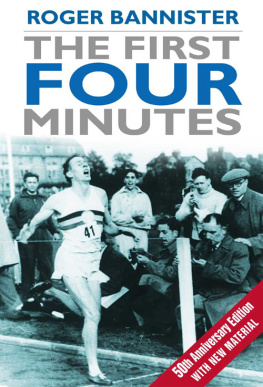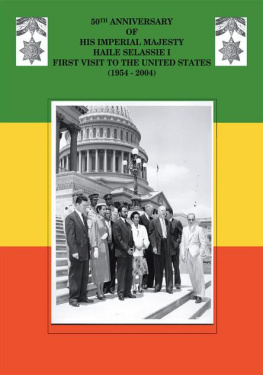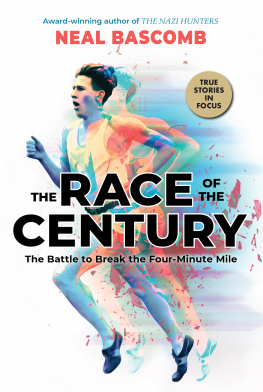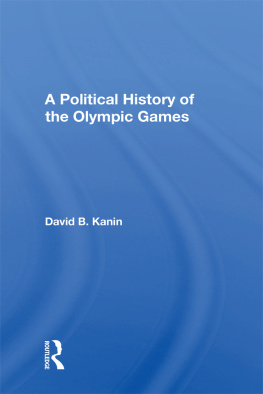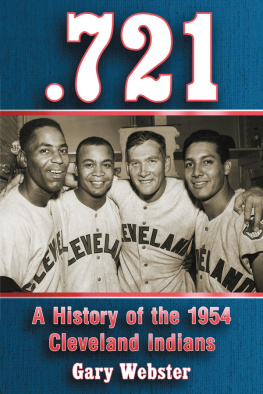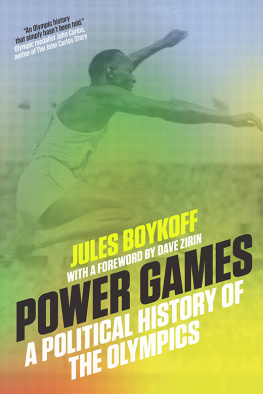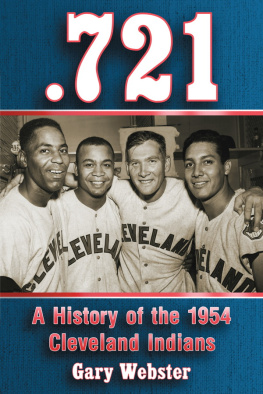THE FIRST
FOUR
MINUTES
50 TH ANNIVERSARY EDITION
ROGER BANNISTER
The First Four Minutes was first published in 1955 by Putnam.
This special hardback limited edition first published in 2004.
Revised and enlarged 50th Anniversary Edition first published in paperback in 2004
First published in 2011
The History Press
The Mill, Brimscombe Port
Stroud, Gloucestershire, GL 5 2 QG
www.thehistorypress.co.uk
This ebook edition first published in 2011
All rights reserved
Roger Bannister, 1955, 2004, 2011
The right of Roger Bannister, to be identified as the Author of this work has been asserted in accordance with the Copyrights, Designs and Patents Act 1988.
This ebook is copyright material and must not be copied, reproduced, transferred, distributed, leased, licensed or publicly performed or used in any way except as specifically permitted in writing by the publishers, as allowed under the terms and conditions under which it was purchased or as strictly permitted by applicable copyright law. Any unauthorised distribution or use of this text may be a direct infringement of the authors and publishers rights, and those responsible may be liable in law accordingly.
EPUB ISBN 978 0 7524 7222 5
MOBI ISBN 978 0 7524 7221 8
Original typesetting by The History Press
Contents
To my wife, Moyra, my children and grandchildren
Introduction to the 50th Anniversary Edition
T he year 2004 is the 50th anniversary of the first four-minute mile. On a windy and rain-sodden day in Oxford in May 1954 my friends Chris Chataway and Chris Brasher* helped me to run the first sub-four-minute mile a goal sought from as far back as Victorian days. The barrier of four minutes had been believed to be insurmountable. John Landy, my great Australian rival, who had run three 4 minute 2 second miles, said, Two little seconds are not much, but when youre on the track those fifteen yards seem solid and impenetrable, like a cement wall. But, as a medical student and physiologist, I knew this could not be true.
Success came through the fortunate link with my friends, who had been University athletes and had the generosity of spirit to help me reach this seemingly unattainable goal. They themselves later triumphed in their own spheres. Chataway famously overtook and defeated the great Russian 5,000-metre champion Vladimir Kuts and broke the world record in 1954. Chris Brasher won his gold medal for the steeplechase in the 1956 Olympic Games, and they both went on to have distinguished careers after retiring from sport.
The original purpose of this book was to try to describe what being a runner was like during my student days, what fun it was, how freely we travelled, how we coped with success and the fame that it brought and how we dealt, too, with the disasters that so suddenly brought us back to earth. The hope was that the whole experience might help others to fill the gap between school and work. I wrote it in just six weeks between retiring from competition and switching to medicine. For some years it has been out of print in Britain and I have been pressed to republish it. I have hesitated because, set as it is in immediate post-war Britain and in an Oxford largely filled with ex-servicemen, it might seem too dated for readers today. But so many have written to say it helped and inspired them that this seemed a good moment to republish and it appears here without a word changed. As newspaper pages show daily, sports dramas can resonate widely as sportsmen try to cope with success and failure, with the long-term disappointments of training and injury, and even with the moral issues of honesty and loyalty. In 2003 Lance Armstrong won the Tour de France for the fifth consecutive year. Six years earlier he had cancer with multiple secondaries, including some in the brain, and was given a 40 per cent chance of living. After treatment, he recovered and, instead of retiring with distinction, he started cycle racing again. The question is why so many of us want to seek such challenges.
I have reflected on rereading this book that, however ordinary each of us may seem, we are all in some way special and can do things that are extraordinary, perhaps until then even thought impossible. When the broad sweep of life is viewed, sport, though instinctive, physical and ephemeral, illustrates a universal truth that most of us find effort and struggle deeply satisfying, harnessing almost primeval instincts to fight, to survive. It gives us all a challenge, a sense of purpose and freedom of choice. It is increasingly difficult to find this in our restricted twenty-first-century lives. The particular target we seek may not be important. But what is important is the profoundly satisfying effort in thought, feeling and hard work necessary to achieve this success.
A seventy-year-old man from Lancashire wrote a letter to me for my seventieth birthday explaining how the four-minute mile had affected him:
It gives me great pleasure to thank you for something you did for me, albeit unknowingly, in 1954. At the time of the first sub-four-minute mile I was also twenty-five, but had no sporting prowess whatsoever, because it seemed I had no talent. Then I saw the epic race at Iffley Road in a newsreel at the cinema... and I wondered if running might be the sport for me! I knew nothing of athletics at that time, but I contacted my nearest club and was invited to join. To cut a long story short, running became my life, and still is, as I still turn out most days. The sport gave me a new lease of life and I am as enthusiastic now as I was in 1954. This is all due to that wonderful race all those years ago. A new vista opened up to me at that time from the inspiration that short glimpse of another world gave to me whilst watching that cinema newsreel. I have no cupboard full of medals or trophies, just a sackful of wonderful friends and very happy memories.**
I hope something in this book both inspires the serious athlete and encourages the recreational runner.
The years since 1954 have been too few and have gone too fast for all I had hoped to do, but in the main they have been very happy and endlessly interesting. I had work I relished, colleagues I admired and many friends in my hospitals, at the Sports Council and lastly during my eight years at Pembroke College. Life has been taxing sometimes, boring never.
Sir Roger Bannister
Oxford
March 2004
* Chris Brasher died on 28 February 2003.
** John Thompson died of cancer in February 2003 but his family tell me that his logs showed he had run 85,000 miles before illness forced him to stop.
The First Four Minutes
Introduction
Write the vision and make it plain upon tables, that he may run that readeth it.
Book of Habakkuk
W hat are the moments that stand out clearly when we look back on childhood and youth?
I remember a moment when I stood barefoot on firm dry sand by the sea. The air had a special quality as if it had a life of its own. The sound of breakers on the shore shut out all others. I looked up at the clouds, like great white-sailed galleons, chasing proudly inland. I looked down at the regular ripples on the sand, and could not absorb so much beauty. I was taken aback each of the myriad particles of sand was perfect in its way. I looked more closely, hoping perhaps that my eyes might detect some flaw. But for once there was nothing to detract from all this beauty.
In this supreme moment I leapt in sheer joy. I was startled, and frightened, by the tremendous excitement that so few steps could create. I glanced round uneasily to see if anyone was watching. A few more steps self-consciously now and firmly gripping the original excitement. The earth seemed almost to move with me. I was running now, and a fresh rhythm entered my body. No longer conscious of my movement I discovered a new unity with nature. I had found a new source of power and beauty, a source I never dreamt existed.

